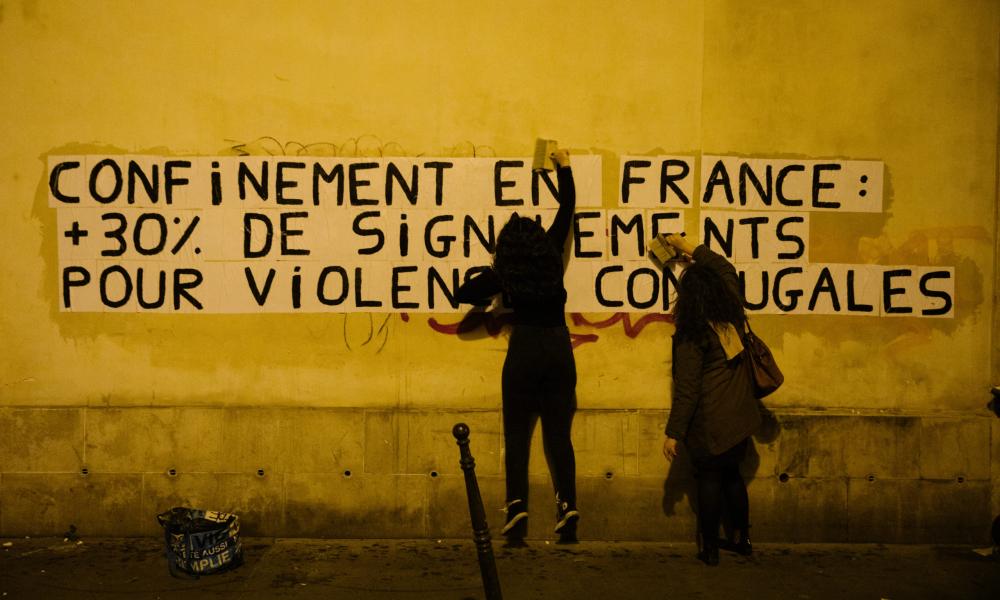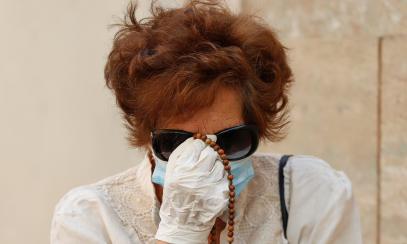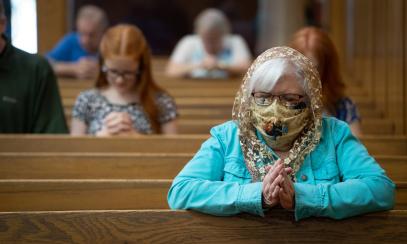
Catholic psychologist calls domestic violence 'pandemic within a pandemic'
PHILADELPHIA (CNS) -- Amid global coronavirus lockdowns, domestic violence has emerged as "a pandemic within a pandemic," said Catholic clinical psychologist Christauria Welland.
"Our rates in the U.S. for physical and sexual violence against women were already at one in three," she said. Based in California, Welland has counseled both those who are abused and their abusers for decades.
During periods of economic crisis and natural disasters, such rates tend to rise, said Welland, adding that the coronavirus has aggravated conditions for domestic abuse, also known as "intimate partner violence."
"We're seeing huge increases in anxiety, uncertainty and feelings of powerlessness," she said. "When those who abuse manage their relationships using a template of power that says, 'I'm in control of you," this kind of insecurity makes them feel vulnerable and puts them at risk of becoming violent."
Unemployment, food and financial instability, confinement and substance abuse have increased the risk of abuse.
In early April, U.N. Secretary-General Antonio Guterres called for "peace in homes around the world" in response to a "horrifying surge in domestic violence" due to stay-at-home orders.
Italy, France, Spain, Russia, India, Australia and Belgium are among the nations that have reported spikes in domestic assaults, with figures ranging from 32% to 75%.
In Pennsylvania, the Montgomery County District Attorney's office detected an 8% to 9% jump in domestic violence calls from January to April, compared to the same period last year.
Although pastoral messages have focused on the coronavirus crisis as an opportunity to strengthen families, stay-at-home orders can have the opposite effect, and Catholics are not exempt, Welland told Catholic Philly.com, the new website of the Archdiocese of Philadelphia.
She gave a presentation on domestic violence during the World Meeting of Families in Philadelphia in 2015 and that same year wrote "How Can We Help to End Violence in Catholic Families?" a guide for clergy, religious and laity that was used at the October 2015 Synod of Bishops on the Family in Rome.
Welland also founded Pax in Familia, an international Catholic ministry dedicated to preventing violence and abuse in families, and serves as a faculty associate for The Catholic University of America's "Catholics for Family Peace" initiative.
The coronavirus lockdowns have compounded the sense of isolation felt by those who are abused, said Welland.
"We're distancing from our normal social supports, and there have been some closures in services such as drop-in places and therapy groups," she said.
Living in close quarters under constant surveillance from perpetrators, those being abused may find it harder to access help, Welland added.
"Some abusers will engage in even more controlling behavior, going through emails, texts, phones and social media accounts," she said. "Some will literally hang over an abused person's shoulder, and she or he cannot find a free moment or quiet place to call for help."
There are still ways to report domestic violence but "finding an opportunity might be hard," Welland said.
In Spain and several other European nations, a campaign now allows women to go to the nearest pharmacy and request a "Mascarilla-19 (Mask-19)," which will alert staff to notify police of domestic assault.
While "we don't have anything like that in the U.S.," said Welland, the use of code words by prior arrangement to alert family and friends can protect those who are being abused.
"If the abuser enters the room and you have to hang up, you've said the most important word that alerts your safety net," Welland said.
Above all, those experiencing domestic violence should "do their own safety planning" while trying to "be at home in the safest way possible" until they can access resources for help, she said.
"Obviously, there are situations where you just have to get out of there," said Welland. "But we have a lot of full shelters right now."
More than ever, abused persons need to "stay calm and use logic and reason" in extricating themselves from danger.
In addition to using code words and keeping in contact with loved ones, Welland recommended teaching children to "stay back from domestic arguments" to avoid injury, and to call 911 in emergencies.
If tension escalates, she said, those at risk of abuse should steer clear of kitchens and bathrooms.
"Kitchens contain weapons such as knives, and bathroom fixtures can cause serious head injuries," she said. "Move toward the door instead."
The presence of firearms -- sales for which soared in the U.S. prior to state lockdown orders -- heightens the risk of injury or death, she said, advising abused persons to hide guns if possible.
Welland also urged those being abused to call 911 if they are in immediate danger, and to contact the National Domestic Violence Hotline at (800) 799-7233 ((800) 787-3224 TTY), through which advocates are available to speak 24/7 in more than 200 languages.
"Don't be afraid or ashamed to reach out," said Welland. "Everyone in these situations needs help."
Seeking divine assistance also is important, she said, noting that both "those being abused and their abusers" should "pray for protection and peace."
"Stay close to the Lord to navigate this time of anxiety and stress," said Welland. "Ask Our Lady to keep your minds calm and your bodies safe."
If you believe you are at risk of becoming abusive, she said, try to use short breaks such as a neighborhood walk "as a time of prayer" and an occasion "to ask for protection from the darker side of yourself."
Families can be assured that the Lord remains fully present to them, even amid a time of social distancing, she said.
"God protects us by showing his love through people," said Welland. "Reach out to those people now."
Editor's Note: Other resources for victims of domestic violence include: VAWnet.org -- National Online Resource Center on Domestic Violence: hotline: (866) 723-3014 and website, https://vawnet.org/news/preventing-managing-spread-covid-19-within-domestic-violence-programs; Catholics for Family Peace, an initiative of the National Catholic School of Social Service at The Catholic University of America in Washington, http://www.catholicsforfamilypeace.org.
Christian is a senior content producer for CatholicPhilly.com, the news website of the Archdiocese of Philadelphia.



